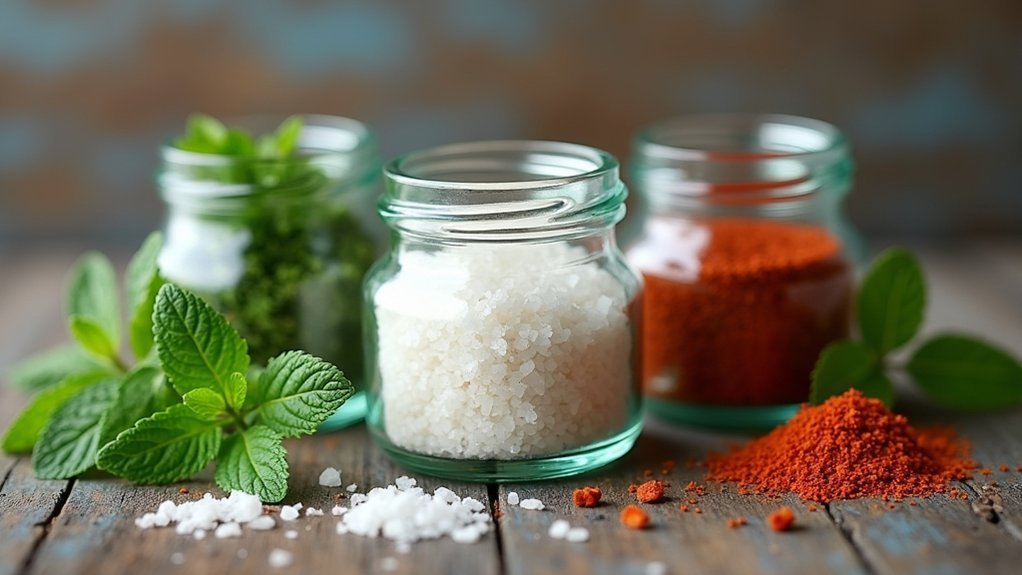Three proven DIY rodent repellents include peppermint oil spray (mix 2 teaspoons with 1 cup water or alcohol), strategic barrier methods (stuff steel wool into entry points), and aromatic herb planting (mint, lavender, and marigolds). Apply the essential oil spray weekly in problem areas and place oil-soaked cotton balls in corners. Replace your barriers regularly and keep areas clutter-free. These natural solutions offer chemical-free protection while the detailed techniques below enhance their effectiveness.
Essential Oil Sprays: Nature’s Rodent Deterrents

When dealing with unwanted rodent visitors, essential oils sprays offer an effective natural solution without the harsh chemicals found in commercial products. Peppermint oil, eucalyptus, and citronella create strong scents that mice and rats simply can’t tolerate.
Creating your own DIY solution is simple: mix 2 teaspoons of your chosen essential oil with 1 cup of water or rubbing alcohol. Apply this natural repellent in areas where you’ve noticed rodent activity, reapplying weekly to maintain effectiveness.
For consistent protection, place soaked cotton balls in closets and corners, replacing them every two weeks.
You might need to experiment with different home remedies to find what works best in your space. If you have pets, consult your veterinarian before using these natural methods to repel rodents.
Barrier Methods Using Household Materials
Creating effective physical barriers remains one of the most reliable ways to keep rodents out of your home. Start by sealing entry points with steel wool and caulk, as mice can squeeze through holes as small as a quarter-inch.
Place aluminum foil balls strategically around your home—rodents hate their sound and texture, making them excellent DIY rodent repellents.
Don’t forget to inspect and reinforce access points around pipes and wires regularly. Baking soda barriers mixed with bait can work effectively, but use caution if you have pets or children.
Keep your storage areas organized and clutter-free to eliminate potential hiding spots. Always store food in sealed containers to remove attractants.
These homemade mouse repellents and barrier methods create an extensive defense system for preventing access and keeping rodents away.
Strategic Planting: Rodent-Repelling Herbs and Flowers

Beyond physical barriers, nature offers powerful allies in your fight against unwanted rodent guests. Strategically planting herbs and flowers with potent aromas can create an effective perimeter that rodents won’t cross.
Nature’s army stands ready—aromatic herbs and vibrant flowers create invisible walls that rodents refuse to breach.
Lavender and mint are particularly powerful deterrents, as rodents find their strong scents overwhelming. Similarly, daffodils and marigolds serve as beautiful yet functional additions to your garden defense system.
For indoor protection, place bay leaf sachets in cabinets and pantries where rodents might seek shelter.
You’ll find that combining different plants strengthens the repelling effect—try surrounding your home with a mix of sage, marigolds, and mint for maximum protection.
This natural approach not only keeps rodents at bay but also enhances your garden’s appearance while supporting a healthier ecosystem without harsh chemicals.
Frequently Asked Questions
What Is the Best Homemade Rodent Repellent?
For the best homemade rodent repellent, you’ll want to use essential oils like peppermint or eucalyptus on cotton balls. Place them strategically and reapply regularly. Seal entry points with steel wool for complete protection.
Does Irish Spring Soap Really Keep Mice Away?
Irish Spring soap may keep mice away due to its strong scent, but there’s limited scientific proof. You’ll find anecdotal success stories, but it’s best to use it alongside proper sealing and cleaning methods.
What Smell Do Mice Absolutely Hate?
Mice absolutely hate peppermint oil, cayenne pepper, vinegar, and predator urine smells. You’ll find they’re repelled by eucalyptus and citronella oils too. These strong scents overwhelm their sensitive noses and disrupt their scent trails.
Will Spraying Vinegar Keep Rats Away?
Spraying vinegar won’t keep rats away long-term. While they dislike the smell, it dissipates quickly and requires frequent reapplication. You’ll need more thorough methods like sealing entry points for effective rodent control.
In Summary
You’ve got three effective DIY solutions to keep rodents away without harsh chemicals. Try essential oil sprays for natural deterrence, set up barriers using everyday items you already have, or plant strategic herbs and flowers that mice and rats hate. Don’t wait until you’ve got a full infestation—start implementing these methods today and you’ll notice fewer unwanted visitors in your home and garden.





Leave a Reply